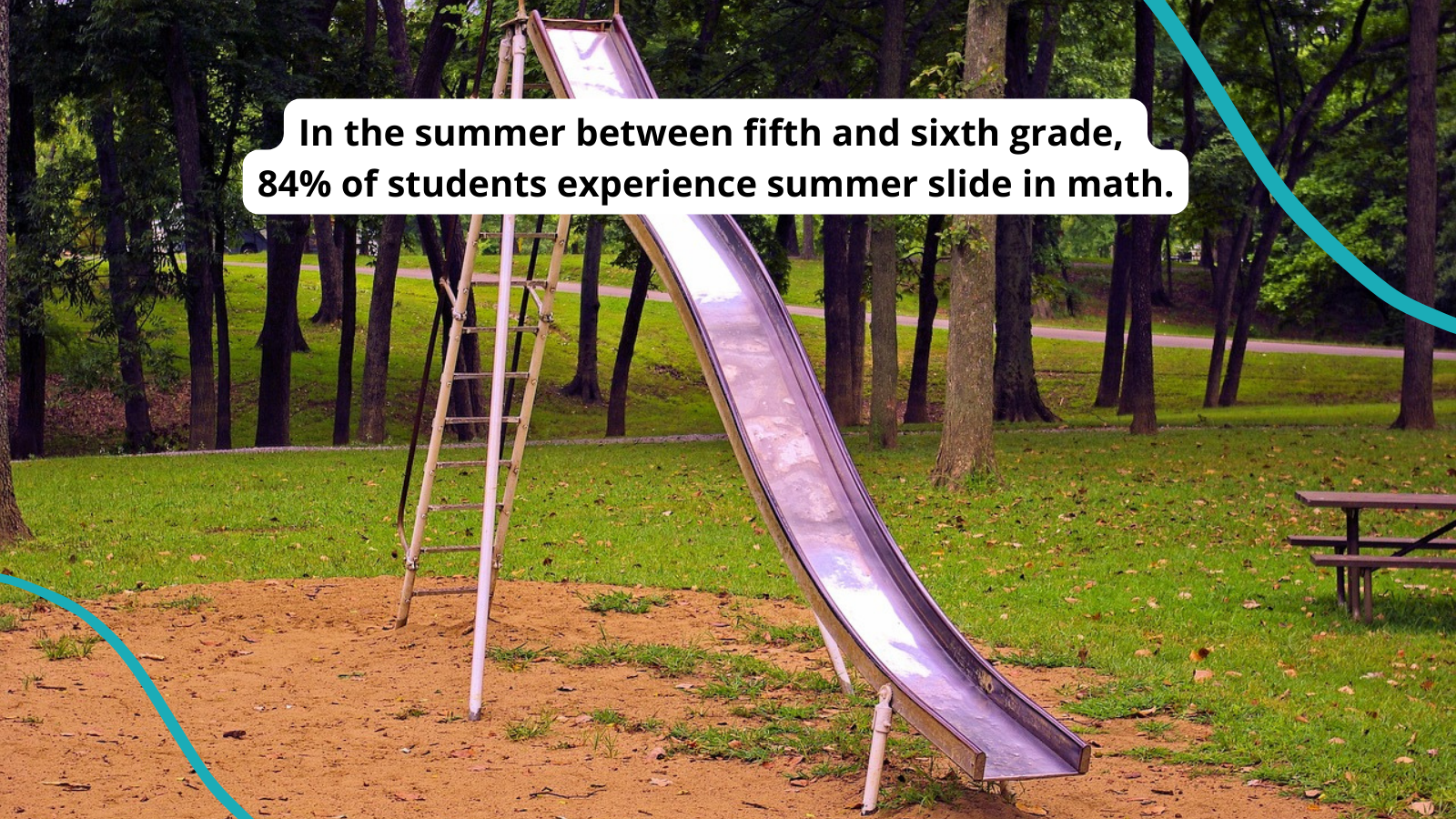Kids and teachers both breathe a sigh of relief when summer break finally arrives. After months of hard work, everyone deserves some time to relax. But are there any downsides to taking two or three months completely off from learning? Some researchers say this schedule leads to significant learning loss, known as summer slide. How worried should parents and teachers be about the negative effects of a long school vacation?
Jump to:
- What is summer slide?
- Is summer slide real?
- What research supports the concept?
- What are the opposing opinions?
- How should parents view summer slide?
- Who is most affected by summer learning loss?
- Free Toolkit With 30+ Tips, Printables, and More To Stop Summer Slide
What is summer slide?
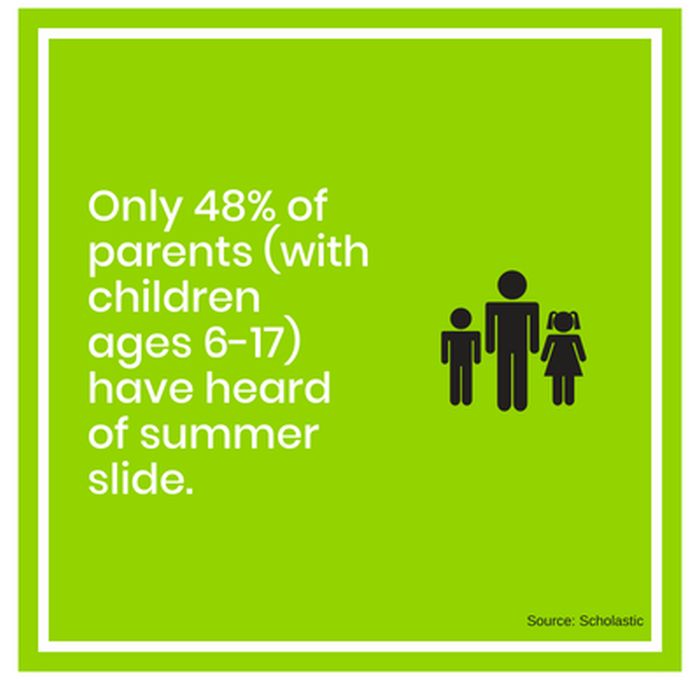
Source: ID Tech
Ask any elementary school teacher, and they’ll tell you that the first few weeks of school are more about reteaching than covering new material. After several months away from the classroom, kids have to relearn how to sit still and focus on schoolwork. But more than that, it often seems students have forgotten a big chunk of what they learned the previous year, and teachers spend the opening weeks of the year catching kids up on what they should already know.
This concept of summer learning loss has been a known phenomenon for many years, and it’s not surprising. After all, even adults can’t recall everything they’ve learned several months later unless they’ve been using the knowledge every day. But in the 1980s and 1990s, researchers began looking into the notion more thoroughly. They developed the term “summer slide” and urged families and educators to take it seriously.
Here are some statistics about summer slide:
- Kids in grades 3 to 5 lose about 20% of their school year gains in reading and 27% of their gains in math. (Source: Scholastic)
- Students lose about a month’s worth of learning on average over the summer. (Source: Sage Journals)
- In the summer between 5th and 6th grades, 84% of students experience summer slide in math. (Source: Kappan)
- The more kids learn during the school year, the more they’re likely to lose over the summer. (Source: Kappan)
Is summer slide real?
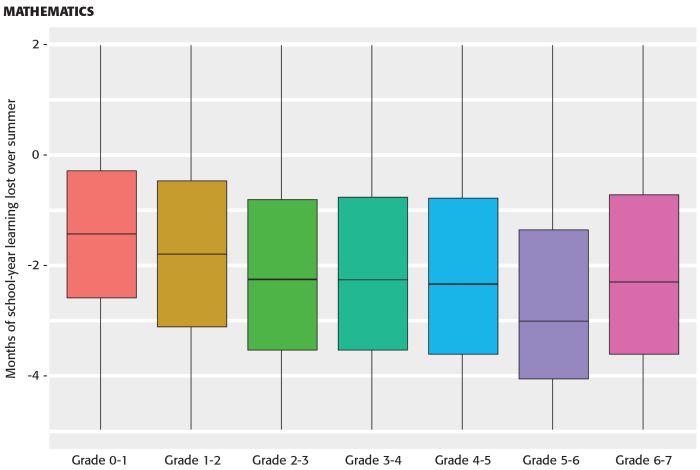
Source: Kappan
Like many educational subjects, there’s debate about summer slide. While anecdotal evidence certainly seems to back up the idea, scientific studies (especially in recent years) have called some long-held beliefs into question. Here’s what some of the research says.
What research supports the concept?
A major 1996 study looked at achievement test scores after summer break. They amalgamated the results of 39 different studies and found that “summer loss equaled about one month on a grade-level equivalent scale, or one-tenth of a standard deviation relative to spring test scores.” This same study indicated the loss was worst when it came to math and spelling. Researchers also found that the loss increased exponentially at higher grade levels.
A more recent study found that students in grades 1 through 8 lose 17% to 34% of the prior year’s learning over summer break. It also indicates that kids who fall behind one summer are likely to widen that gap even more as time goes on.
Researchers have also explored the differences in summer slide between various races, ethnicities, and income groups. Interestingly, a 2019 study found that achievement gaps between white and Black students actually shrink during the summer months. In other words, Black students in this study lost fewer academic skills over the summer than their white peers.
Learn much more about summer learning loss research here.
What are the opposing opinions?
Given the decades of research supporting the idea of summer slide, it’s no wonder that Paul T. von Hippel made huge waves with his 2019 article “Is Summer Learning Loss Real?” A policy professor at the University of Texas at Austin, Von Hippel said he’d “lost faith” in this idea.
When Von Hippel reviewed some of the most seminal research on summer learning loss, done in the 1980s, he found some serious issues related to how achievement tests were written at the time. What’s more, he was unable to replicate the results of that older study using today’s modern exams.
His research also showed that most achievement gaps are in place before the age of 5. This means that by the time kids enter kindergarten, they’ve already fallen into achievement groups that they’re likely to remain in throughout their school years. As Von Hippel points out, that means that studies indicating learning loss gaps widened over the years were unlikely to be true.
How should parents view summer slide?
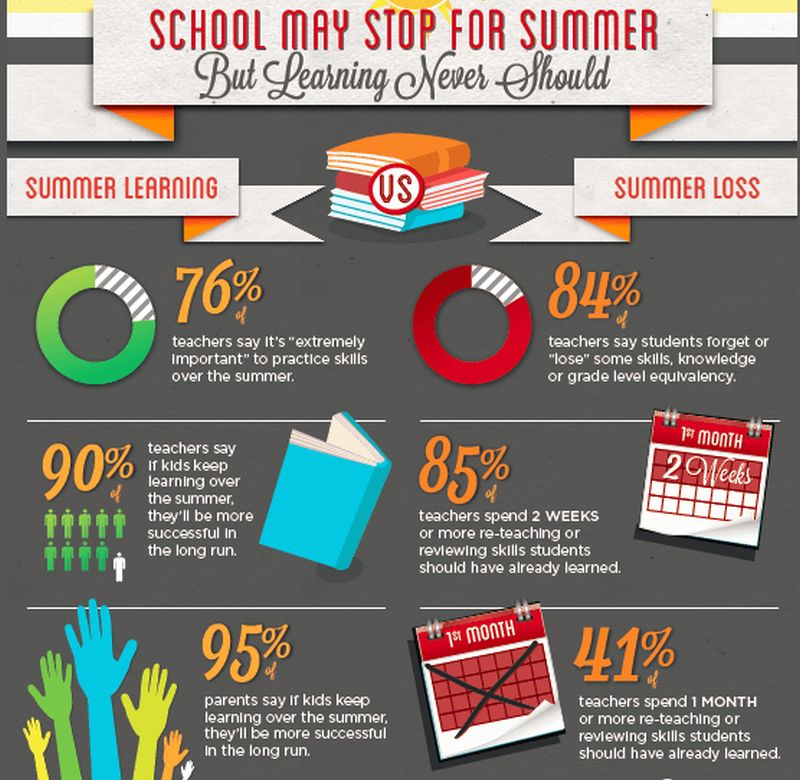
Source: teacherevolution
So, where does all this leave parents and families? The answer is we’re not completely sure. What we do know is that when kids return to school in the fall, at least some of them have suffered pretty significant learning loss (see below). And while the term “summer slide” is generally used to apply only to academics, teachers can tell you that kids lose a lot of other skills over the summer too.
As adults, think about what it’s like when you take a week or two off from work. That first day back is usually pretty brutal, right? Not only do you have a ton of work to catch up on, but your body isn’t used to the schedule. Your mind isn’t used to focusing on one task when you’d really rather be doing something else.
Students have the same issues, multiplied by months away from school rather than just a week or so. Potential summer learning loss is compounded by the loss of study skills and other key behaviors. Kids often spend the first few weeks back at school relearning how to learn in the first place.
So whether you view summer slide as an accepted fact or with some healthy skepticism, there’s still value in working some structure and educational activities into every kid’s summer break. (Find top ideas below.)
Who is most affected by summer learning loss?
The bulk of research currently supports the idea of at least some summer learning loss in most students. Perhaps more importantly, it highlights some groups that suffer from summer slide at much higher rates.
- Early learners: The early elementary years are especially key for potential summer learning loss. Because students are learning such vital skills in reading and math, any backward slide can cause problems when kids return to school.
- Low-income families: According to The New York Times, “While the achievement gap between White and Black students has narrowed significantly over the past few decades, the gap between rich and poor students has grown substantially during the same period.” These families often don’t have the same time and resources to devote to kids outside of school, especially in the summer.
30+ Free Tips and Tools To Fight Summer Slide
Whether you’re an educator teaching summer school or a parent convinced it’s worth helping your kids fight potential learning loss over the summer, try these free tips and tools.
Read, read, read—ANYTHING
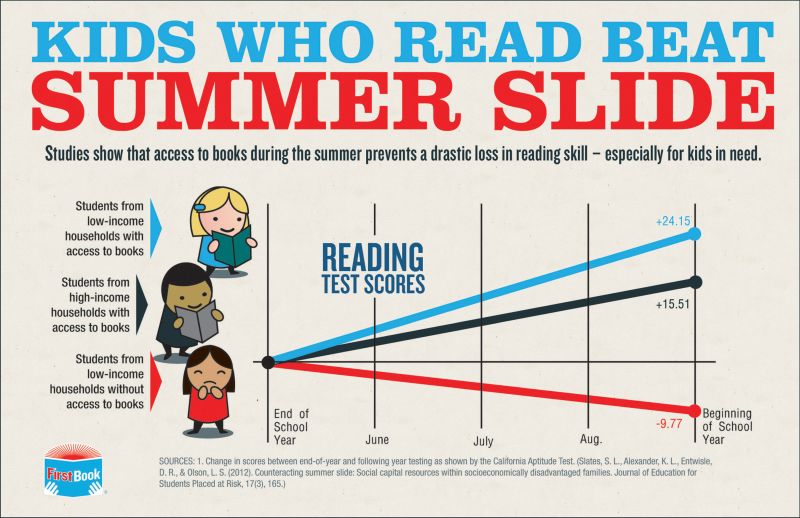
Source: LINC
You’ve heard it before, and we’ll say it again: All reading is good reading. Summer is the perfect time to let kids read whatever they like (yes, even comic books and those ubiquitous Captain Underpants books). Summer reading should have two goals: to sharpen kids’ literacy skills and to develop a love of reading to last a lifetime.
- How To Get Students To Love Summer Reading
- The Best 2023 Summer Reading Programs for Kids
- 2023 Summer Reading List for Kids and Teens (140+ Picks!)
- 25 Read-Alouds That Celebrate Summer
- Free Summer Reading Bundle
Get creative
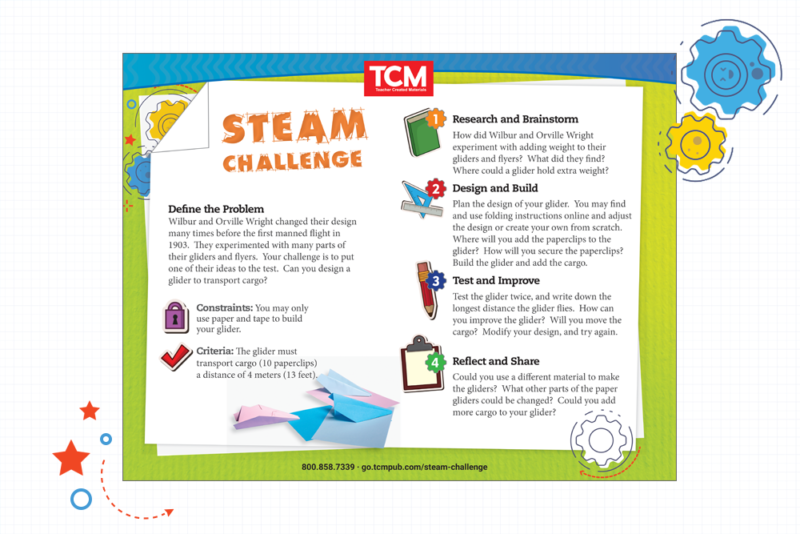
Even when they’re not focusing directly on math or reading skills, kids benefit from hands-on creative activities. Do some crafts, learn to draw, write a story, build something new—any and all of these activities can keep kids in learning mode throughout the summer months.
- Free Printable: Paper Airplane STEAM Challenge from the Summer Scholars, a language arts and math program for rising grades 1-8
- Free Printable: 30-Day Summer Drawing Challenge
- Fun and Easy Summer Crafts for Kids
Spend 20 to 30 minutes 3 to 5 times a week on structured educational activities
Summertime really should be mostly about relaxation, but a little structured learning every day or two won’t take away from the fun. Make the investment in some age-appropriate reading and math workbooks, or sign up your kids for an online learning program that allows them to work at their own pace. Write these activities into your schedule alongside the Little League games and family picnics, and hold kids accountable for completing them.
- Teacher-Approved Workbooks for Kindergarten, First, Second, Third, Fourth, and Fifth Grades
- 350+ Online Learning Resources for Parents and Families
Learn as a family
Many families treasure summer as a chance to spend more time together after the busy days of the academic year. As you’re planning your summer fun, work in some educational ideas. Buy and play games with an educational aspect, start a family book club, or challenge kids to a weekly trivia night.
- How To Start a Family Book Club
- 52 Most-Loved Educational Board Games
- 16 Everyday Activities That Count as Learning
- 40 Free Scavenger Hunt Ideas for Kids
Let travel be enlightening
Planning a family vacation? Try to work in a few learning opportunities, like museum visits or historical sites. These don’t necessarily need to be the focus of your trip, but emphasizing learning when school’s out keeps kids’ brains active and reminds them that not all education is dull.
Take the learning outside
Structured learning is good, but so is educational play! Kids often want to be outdoors in summertime, so take your learning activities out there too. Check out these roundups for ideas.
- 33 Splash-tastic Water Activities for Summertime Fun and Learning
- 60 Wet and Wild Outdoor Science Activities and Experiments
- 25 Teacher-Approved Outdoor Educational Toys
- 50 Tricks, Tips, and Ideas To Teach With Nature
- 35 Active Math Games and Activities for Kids Who Love To Move
Make screen time valuable
Rather than fighting screen time, try working with it. Show kids the benefits of reading e-books (especially the ability to easily look up words or ideas they don’t understand). Direct them to educational but truly entertaining games. Even encouraging them to learn to use new features on their devices (camera settings, for instance) can trigger their brains to remain active.
- 45 Best Free and Paid Reading Websites for Kids
- 40 Amazing Educational Virtual Field Trips
- 34 Best Coding Games for Kids in 2023
Sneak in some educational toys
We don’t just mean the stuff that’s marketed as educational (though we’ve shared our favorites below). Instead, look for ways to encourage learning through the kind of play your kids enjoy anyway. For instance, building LEGO sets helps with counting, fine motor skills, following directions, and many other concepts. Plus, many of today’s sets offer learning opportunities through themes such as space travel or dinosaurs. You might be surprised what your kids’ favorite toys can teach them!
- Teacher-Approved Educational Toys for Preschool, Kindergarten, First, and Second Grades
- The Best Construction and Building Toys, According to Teachers
Participate in summer camps
Your local libraries, museums, children’s centers, theaters, and more may all offer summer camps for kids. Many of these offer scholarship opportunities too, so don’t assume you can’t afford these activities.
Use kids’ interests
Think about what your child likes to do, and find ways to expand on it. Are they sports fans? Dive deep into the various statistics of a particular sport, and they won’t even realize they’re practicing math skills. Do they love to dress up and play pretend? Ask them to write a script and then perform a play. Video game fanatic? Maybe they’d like to learn how to code their own. When you tie learning to something that interests kids, you take important steps toward fighting summer slide.
Teachers, how do you help families fight summer learning loss? Come share your ideas in the We Are Teachers HELPLINE group on Facebook.
Plus, Creative Ways Schools Are Supporting Families Over Summer Break.

